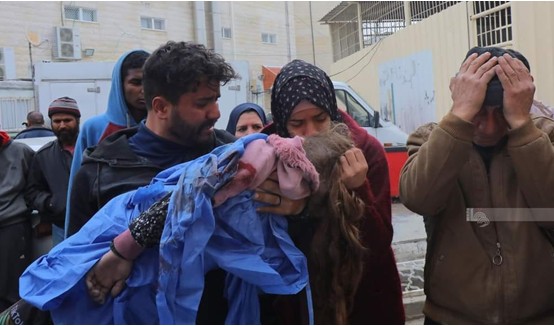The Biden administration is preparing to send more bombs and other weapons to Israel that would add to its military arsenal even as the US pushes for a ceasefire in Gaza, The Wall Street Journal reports on Saturday, February 17, citing current and former US officials. According to the report, the proposed shipment includes around a thousand MK-82 bombs, fuses and JDAM guidance kits to make the munitions more precise, a package estimated to be worth tens of millions of dollars.
According the newspaper, “The U.S. has provided roughly 21,000 precision-guided munitions to Israel since the start of the war, and Israel has used roughly half of those. According to a U.S. intelligence assessment, the remaining weapons are enough for Israel to sustain 19 more weeks of fighting in Gaza.”

Relatives of Palestinians victims of the ongoing Israeli war in Gaza at the yard of the Al-Aqsa Martyrs Hospital in Deir el-Balah, February 9, 2024 (Photo: WAFA)
A US official quoted by the newspaper says the proposal is still undergoing internal administration review and could change before being sent to congressional committee chiefs for approval.
The report also cites an assessment on the proposal by the US Embassy in Jerusalem, which says the Israeli government is seeking “rapid acquisition of these items for the defense of Israel against continued and emerging regional threats” and it reportedly finds no human rights concerns about the deal.
UN humanitarian officials say Palestinians in Gaza’s southern city of Rafah are reportedly moving out of that region toward central areas around Deir al-Balah as intensified Israeli airstrikes continue. An estimated 1.4 million Palestinians, more than half of Gaza’s population, have crammed into Rafah, most of them displaced by fighting elsewhere in the territory. Hundreds of thousands are living in sprawling tent camps.
UN spokesman Stephane Dujarric tells reporters Friday about the reported movements toward Deir al-Balah, which is roughly 16 kilometers north of Rafah. He also describes the lack of food in Rafah and elsewhere — especially in northern Gaza, the first target of the offensive, where large areas have been completely destroyed. “In Rafah, humanitarian conditions have become increasingly severe, with continued reports of people stopping aid trucks to take food,” he says. “Vulnerable segments of the population include children, the elderly, and people with underlying health conditions, are particularly susceptible to the risk of malnutrition.” Throughout Gaza, Dujarric says the delivery of aid is hindered by frequent border closures, longstanding import restrictions of goods into Gaza, damage to critical infrastructure, and the security situation.
According UN sources, intense Israeli bombardment from air, land and sea continues to be reported across much of the Gaza Strip, resulting in further civilian casualties, displacement, and destruction of civilian infrastructure. Widespread ground operations and heavy fighting between Israeli forces and Palestinian armed groups also continue to be reported, especially in the centre of Khan Younis and east of Deir al Balah.
Between the afternoon of 15 February and 11:00 on 16 February, according to the Ministry of Health (MoH) in Gaza, 112 Palestinians were killed, and 157 Palestinians were injured. Between 7 October 2023 and 11:00 on 16 February 2024, at least 28,775 Palestinians were killed in Gaza and 68,552 Palestinians were injured, according to MoH in Gaza.
On Wednesday, February 14, the International Committee of the Red Cross emphasized that international humanitarian law “protects all civilians from the effects of hostilities, including those who may not be able to depart Rafah,” and added: “Israel, as the occupying power, must ensure that the basic needs of the civilian population are met. In addition, it is necessary … that the trickle of aid being let into Gaza becomes a steady, robust stream: food, drinkable water, hygiene items, medicines, and materials to do basic sanitation and allow for adequate shelter.”
Related: https://maki.org.il/en/?p=31582


